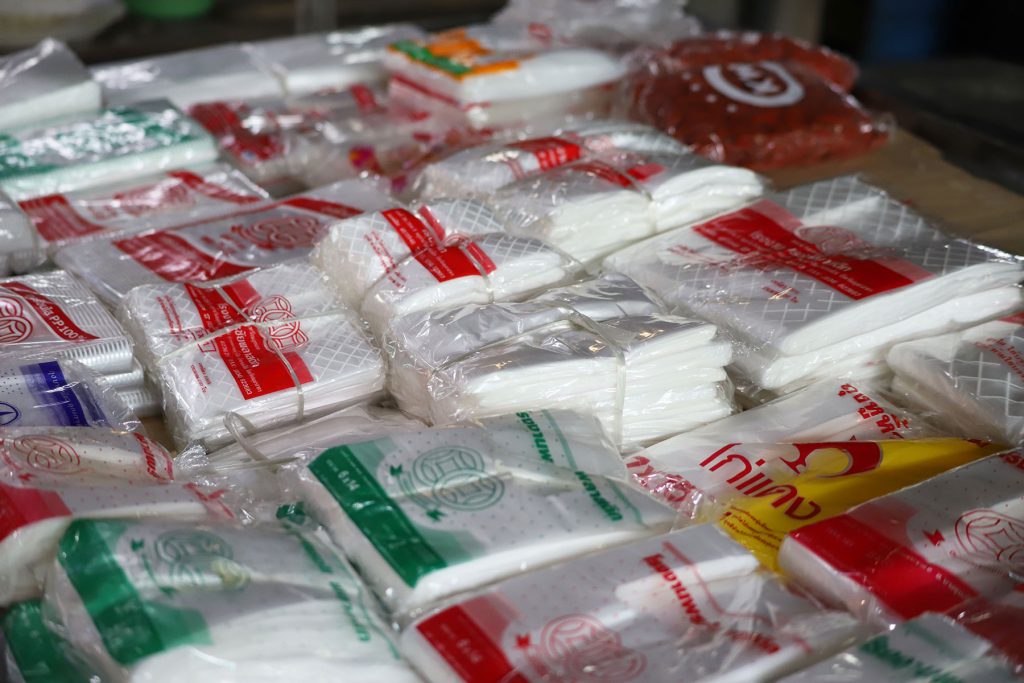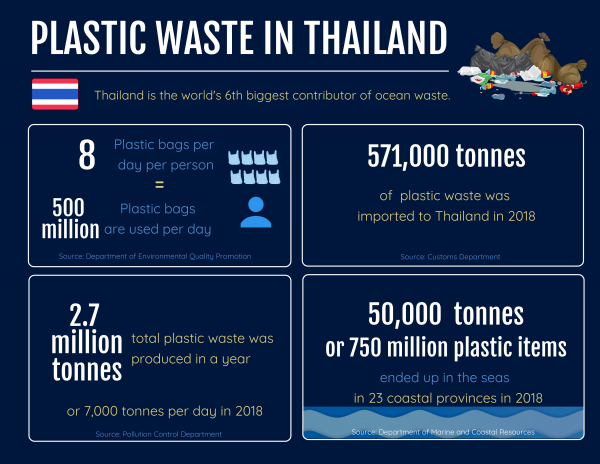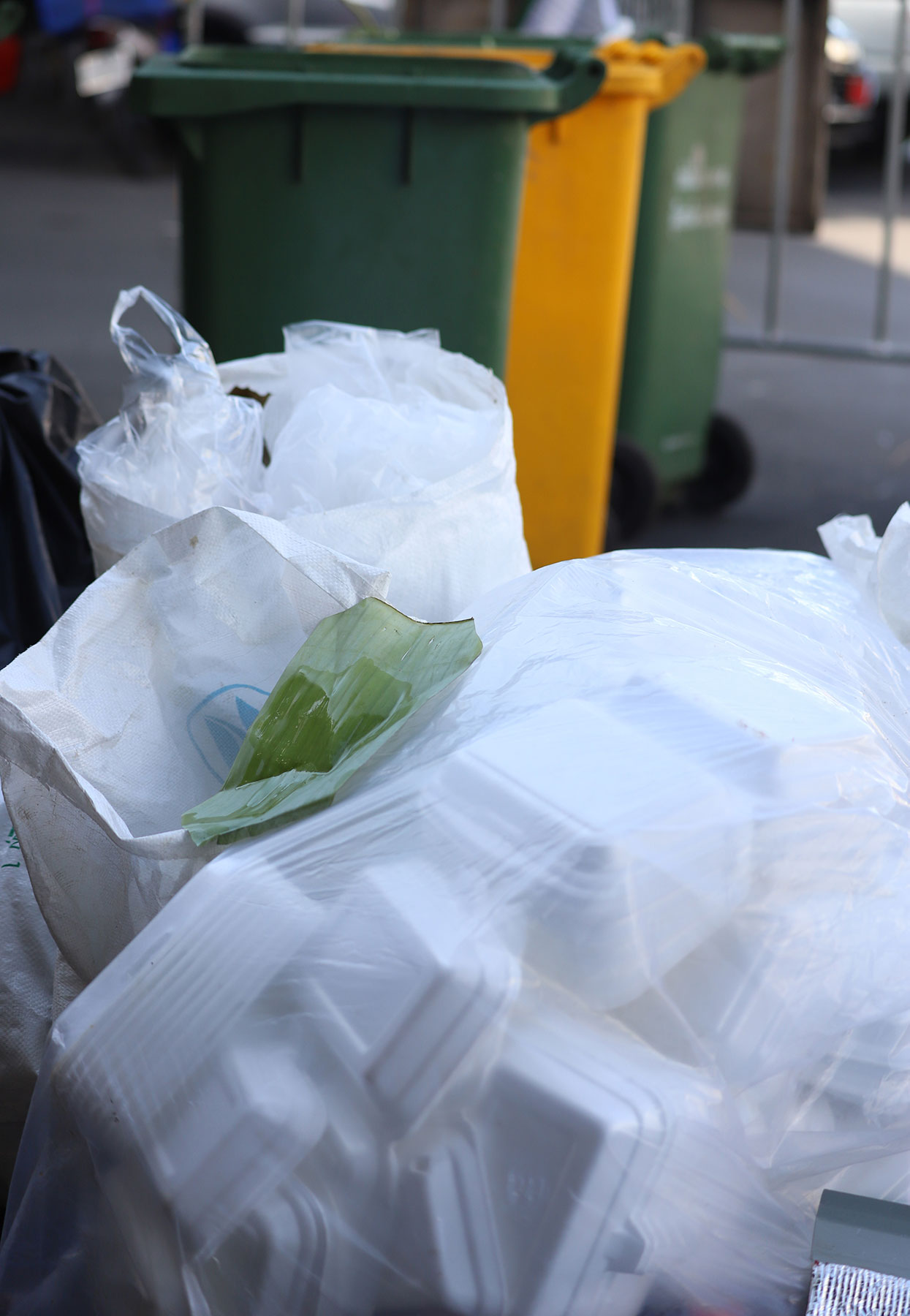Plastic Crisis: Time to reduce – stop your use of single use plastics!

Plastic has been a global issue over the past few years and recently again made headlines when baby dugong Marium died as a result of ingesting plastic. This incident is hardly new. Prior to that, a deer in Khao Yai died after eating plastic, a stranded pilot whale was found in Songkhla province, its belly filled with 80 plastic bags, and a dead leatherback turtle was found on the beach in Rayong province with nine plastic bags and other plastic waste in its stomach. The untimely deaths of these creatures are likely to represent just the tip of the iceberg.
They are also a sad testament to the unthinking use of plastics by humans. While a multitude of other threats exist that impact us directly and indirectly, the long lifespan of some types of plastic means that it can outlive man and its prevalence, as evidenced by used plastic that has accumulated over decades and even centuries, poses an enormous threat to all life on the planet.
Quick Facts about Plastic
Plastic was invented by Leo Baekeland, a Belgian chemist in 1907 while he was in the USA.
It is made of mostly coal, crude oil and natural gas.
Convenient, cheap to produce and to buy, easy to find, lightweight, water resistant, thermal conductive, highly versatile and durable: these are the main characteristics of plastic, some of which can be made into life-saving materials such as those used in healthcare.
On the dark side, it takes 450-1,000 years, depending on the type, to degrade and fully break down and disappear from the earth while the average time that a plastic bag is used is just 12 minutes.
Plastic is processed into micro-plastic which releases toxins and is harmful to animals and people. When it is burnt, it emits toxin into the atmosphere. The chemicals it contains affect the hormonal mechanism.
Plastic will contribute Greenhouse gases in the equivalent of 850 million tons of Carbon dioxide (CO2) to the atmosphere in 2019.
Where does the waste come from?

Thailand is one of the biggest plastic waste polluters. It is the world’s 6th biggest contributor of ocean waste. The nation generated 26.85 million tonnes of waste in 2018 which equals 1.13 kilograms per person per day. 2.7 million tonnes of this were plastic and foam or on average 7,000 tonnes a day. 5,300 tonnes is plastic.
500 million plastic bags are used per year, averaging 8 plastic bags per day per person (survey in 2017 by the Pollution Control Department).
23% or 6.22 million tonnes of the total waste per year remain uncollected or are disposed of improperly.
In 23 coastal provinces, 10 million tonnes of waste are generated per year of which 5 million tonnes are improperly disposed of. The Department of Marine and Coastal Resources also revealed that an alarming 50,000 – 60,000 tonnes of plastic waste or 750 million plastic items ended up in the seas in 2018.
The plastic waste found in the seas includes bags (18%), plastic bottles (17%) and food containers (9%), straws (5%) and plastic bottle caps (3%).
What has been done to alleviate the situation?
Recently, the Ministry of Natural Resources and Environment invited retailers, departments, trade associations and plastic manufacturers to join the campaign to reduce the use of single-use plastic bags. They pledged to stop giving out single-use plastic bags starting in January 2020.
The target on the roadmap to Tackle Plastic Waste 2018-2030 states that by the end of 2019, Thailand will ban three plastics from use, namely microbeads, cap seals, and oxo-degradable plastics, which are plastics that fragment and become microplastics. It can easily leak into the environment and be absorbed by animals. By 2022, four other types of single-use plastic including lightweight plastic bags that are less than 36 microns thick, styrofoam food containers, plastic cups and plastic straws will be banned. All plastic waste in Thailand must be 100% recycled by 2027 including by turning waste into energy.
Five big drinking water producers have discontinued the use of plastic cap seals since April 2018. The small producers will discontinue the use of plastic cap seals by 2019.
The Food and Drug Administration (FDA) has announced a ban on the production, import and selling of cosmetics containing microbeads.
What are other countries doing?
Like many other countries, Canada aims to ban single-use plastics by 2021.
India will abolish all single-use plastics by 2022. Its prime minister will launch the campaign with a ban on plastic bags, cups, plates, small bottles, straws and certain types of sachets.
China imposed a ban on foreign plastic waste imports in 2017. Kenya made headlines last year for introducing the world’s toughest law on plastic bags. Anyone in Kenya who produces or sells plastics risks up to 4 years in prison or fines of $40,000 (around 1.2 million Thai Baht) and anyone using plastic bags may risk 1 year in prison or fines of $500 (15,000 Thai Baht).
Germany’s Federal Ministry for the Environment, Nature Conservation and Nuclear Safety (BMU) announced a five-point plan to reduce the nation’s plastic waste in 2018. The plan includes
- Avoiding unnecessary products and packaging
- Making packaging and other products more environmentally friendly through new licensing rules
- More recycling, more recycling stations
- Preventing plastics from getting into organic waste
- International efforts to limit plastic waste in the oceans that include increasing aid donations
(Source: Deutsche Welle)
The German government has also announced a deposit return scheme (Pfandsystem) under which consumers purchasing a drink pay a small sum on top of the price of the drink which will be reimbursed when they bring the container to a collection point.
The German government has long been supporting different countries including Thailand in sustainable development through GIZ in the fields of agriculture and food safety, climate change, energy, good governance, transport, urban and industrial development, waste and natural resources management and vocational education.
Within the scope of plastic waste and waste issues, the Rethinking plastics – circular economy solutions to marine litter project supports a transition towards sustainable consumption and production of plastic in East and Southeast Asia to contribute to a significant reduction of marine litter. It also aims to strengthen EU cooperation with countries in the region in the areas of circular economy, plastic waste and marine litter reduction. The project is funded by the German Federal Ministry for Economic Cooperation and Development (BMZ) and European Union.
Thai-German Climate Programme – Waste (TGCP-Waste) supports the Thai government in improving and supporting the implementation and achievement of the Nationally Determined Contribution (NDC) target of the national framework conditions for integrated and climate-friendly municipal solid waste and wastewater management. The project is funded by BMU.
Advancing and Measuring Sustainable Consumption and Production (SCP) for a Low-Carbon Economy in Middle-Income and Newly Industrialized Countries (Advance SCP) project supports the integration of climate friendly criteria into the eco-labels of the Thailand, Indonesia, Malaysia and Philippines and improvement of mutual recognition of the eco-labels in the Southeast Asian region.
Cooperation is the key in any effort to achieve a set goal nationally and globally. Tackling this issue involves far more that pushing consumers to reduce the amount of plastic they use. It requires the efforts of all sectors – government, producers, retailers, civil society and media. The roles of government lie in imposing laws, rules or regulations, that of researchers, scientists or product designers in finding sustainable alternatives, consumer goods companies in opting for climate-friendly packaging, while the media and civil societies must raise awareness and individuals change consumption behavior.
Sources: The Guardian, National Geographic, Deutsche Welle, Reuters, Department of Environmental Quality Promotion, Department of Marine and Coastal resources, Bangkok Post,
GALLERY
Kanjana Ngamkalong
PR and Communications Officer
Email:kanjana.ngamkalong(at)giz.de
